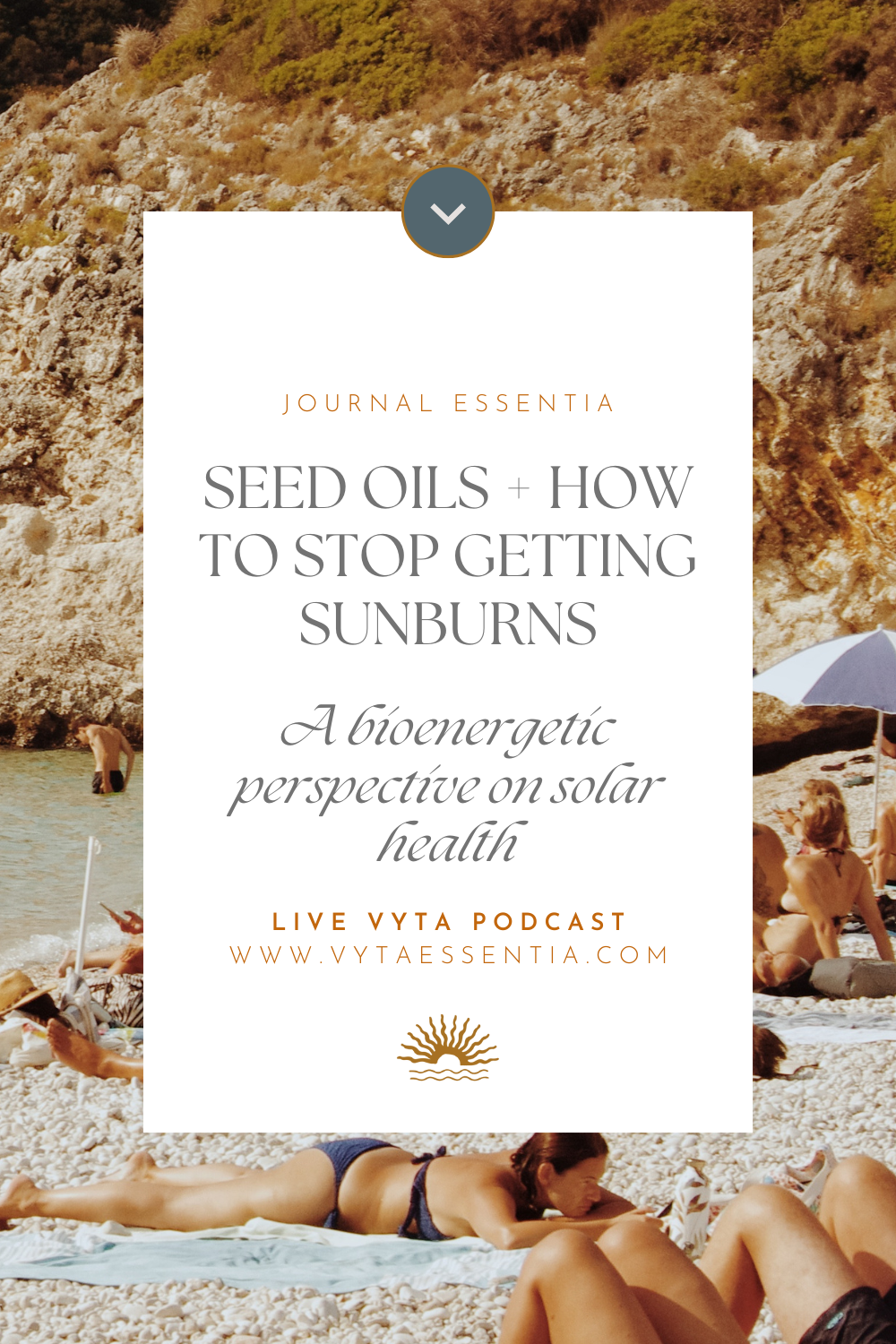Sunburn, Circadian Rhythm & Seed Oils
How to Stop Getting a Sunburn: Solar Callusing, PUFAs, and Nourishing Your Skin From Within
Sunlight Is Not the Enemy—Disconnection Is
One of the most empowering shifts we can make when it comes to wellness is learning how to work with nature, not against it. And nothing brings this home more clearly than the sun. We’ve been told to fear it—slather on SPF, hide indoors, and treat sunlight like a threat.
But what if, instead, we built a resilient relationship with it? What if we honored light as a nutrient, a circadian signal, and a healing force, and approached sun care with curiosity, intuition, and ancestral wisdom?
That’s what we’re diving into today.
Want all the details? Listen to Episode 8 of the LIVE VYTA Podcast below!Why Early Morning Light Matters
The goal is not to sunbathe at noon. It’s to align your biology with the rhythm of the earth. That starts with red and infrared light at sunrise and sunset, which support:
Mitochondrial repair
Reduction in oxidative stress
Skin preconditioning for safer UV exposure later in the day
Even five minutes of being outside at dawn or dusk can send powerful quantum messages to your brain and cells, helping you feel grounded and regulated. If you’ve seen red light therapy panels, they’re designed to mimic these exact frequencies of light—but nature gives it to us for free.
Building Your Solar Callus (a.k.a. How to Tan)
A solar callus is your body’s natural tolerance to the sun. It builds slowly and seasonally. Here’s how you start:
Expose skin to direct morning light. This is when UV is low but red light is high.
Increase surface area over time. Let more skin get light as your tolerance builds.
Pair exposure with nutrition and smart protection. We'll cover this below.
This is not about earning your sun time by burning. It’s about intuitive, cyclical exposure that supports your biology.
Smart Sun Protection = Ancestral Living
Solar protection does not come from a bottle. It comes from your lifestyle, your food, and your environment. Traditional cultures used:
Timing: staying indoors or shaded during peak UV hours
Shade & rest: midday breaks in the hottest climates
Clothing: loose, breathable, full-coverage fabrics like linen and cotton
If you’re in full sun with no shade options, mineral sunblocks made with non-nano zinc oxide and a stable saturated fat base (like tallow, shea butter, coconut oil) are your safest option. Avoid chemical sunscreens (e.g., oxybenzone, avobenzone) that may disrupt hormones and increase oxidative damage.
The Seed Oil Connection: PUFAs & Skin Sensitivity
Excess PUFAs (polyunsaturated fats) from industrial seed oils like canola, soybean, and sunflower are unstable and oxidize easily under light and heat. They can:
Disrupt your fatty acid balance
Increase systemic inflammation
Make your skin more prone to burning
Instead, prioritize saturated fats like:
Butter
Egg yolks
Raw dairy
Animal fats
Liver
And support your body’s antioxidant system with:
Vitamin E (hard to get in therapeutic doses through food alone)
Vitamin C from berries, citrus, rose hips
Retinol (Vitamin A) from animal sources
You don’t need to panic over eating out or occasional chips. But understanding your fatty acid profile—your long-term dietary patterns—can help you rebuild your skin’s resilience.
Foods That Support Sun Tanning, Instead of Sunburning
The very foods that ripen at the sun’s peak also help us thrive in it. Seasonal eating is nature’s way of protecting us:
Berries (Vitamin C)
Tomatoes + watermelon (lycopene)
Leafy greens (magnesium + antioxidants)
Liver, egg yolks, raw dairy (fat-soluble vitamins A, D, E)
Astaxanthin (a red pigment found in wild-caught salmon, trout, krill, shrimp, and algae).
These foods support tissue repair, skin resilience, hormone function, and mood—all deeply connected to your experience of sunlight.
Sunburn Home Remedies: what to do after a burn
Sometimes it happens. Here’s how to support your skin afterward:
Hydrate well – mineral-rich water, coconut water, adrenal cocktails
Cool shower – not hot
Moisturize with tallow or aloe
Eat regenerative foods – liver, egg yolks, gelatin, berries
Supplement strategically – vitamin C, vitamin E
Sleep deeply – pitch-black environment supports melatonin, your skin’s overnight antioxidant
Some people swear by apple cider vinegar (diluted) applied to the skin if it’s not a bad burn
Trust your body – shift from fear to nourishment
Circadian Rhythm and Mood in Summer
More light = more mitochondrial demand. If your body is depleted, this can create symptoms like:
Summer depression or anxiety
Agitation or fatigue
Light sensitivity or overwhelm
Why? Because your environment is signaling “go” but your body can’t meet the demand. If this resonates, gently ease into solar rhythms:
Start with sunset walks
Create evening wind-down routines
Dim lights after sundown and use red lens glasses
Sleep in a pitch-black room to boost melatonin and repair
Your 6-Step Solar Resilience Plan
Get outside early (sunrise to 9am) to regulate your circadian clock
Eat for solar resilience – retinol, vitamin C, E, and stable fats
Reduce PUFAs – minimize industrial seed oils gradually
Use smart protection – mineral sunscreen, natural fabrics, shade
Hydrate wisely – focus on minerals + whole food electrolytes
Create evening routines – support melatonin + nervous system
Final Thoughts: Light Is Your Ally
Sunlight isn’t the villain—it’s our disconnection from nature that causes harm. Rebuilding your relationship with light, seasonality, and nourishment is a form of radical empowerment. The sun nourishes, signals, heals—and yes, burns—when we’re out of sync. But with intention and alignment, it becomes a powerful tool for mood, metabolism, and resilience.
So let this summer be the season where you reconnect. Where you get curious, not fearful. Where you honor your rhythms. And where your wellness flows from light, nourishment, and trust.
Stay well + enjoy the sunshine ☀️

